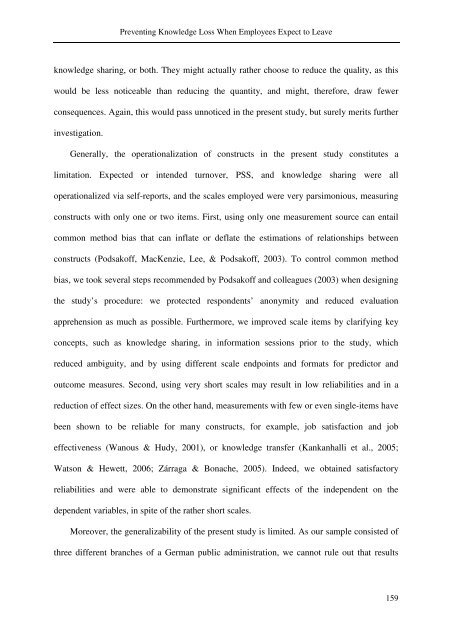thesis_Daniela Noethen_print final - Jacobs University
thesis_Daniela Noethen_print final - Jacobs University
thesis_Daniela Noethen_print final - Jacobs University
Create successful ePaper yourself
Turn your PDF publications into a flip-book with our unique Google optimized e-Paper software.
Preventing Knowledge Loss When Employees Expect to Leave<br />
knowledge sharing, or both. They might actually rather choose to reduce the quality, as this<br />
would be less noticeable than reducing the quantity, and might, therefore, draw fewer<br />
consequences. Again, this would pass unnoticed in the present study, but surely merits further<br />
investigation.<br />
Generally, the operationalization of constructs in the present study constitutes a<br />
limitation. Expected or intended turnover, PSS, and knowledge sharing were all<br />
operationalized via self-reports, and the scales employed were very parsimonious, measuring<br />
constructs with only one or two items. First, using only one measurement source can entail<br />
common method bias that can inflate or deflate the estimations of relationships between<br />
constructs (Podsakoff, MacKenzie, Lee, & Podsakoff, 2003). To control common method<br />
bias, we took several steps recommended by Podsakoff and colleagues (2003) when designing<br />
the study’s procedure: we protected respondents’ anonymity and reduced evaluation<br />
apprehension as much as possible. Furthermore, we improved scale items by clarifying key<br />
concepts, such as knowledge sharing, in information sessions prior to the study, which<br />
reduced ambiguity, and by using different scale endpoints and formats for predictor and<br />
outcome measures. Second, using very short scales may result in low reliabilities and in a<br />
reduction of effect sizes. On the other hand, measurements with few or even single-items have<br />
been shown to be reliable for many constructs, for example, job satisfaction and job<br />
effectiveness (Wanous & Hudy, 2001), or knowledge transfer (Kankanhalli et al., 2005;<br />
Watson & Hewett, 2006; Zárraga & Bonache, 2005). Indeed, we obtained satisfactory<br />
reliabilities and were able to demonstrate significant effects of the independent on the<br />
dependent variables, in spite of the rather short scales.<br />
Moreover, the generalizability of the present study is limited. As our sample consisted of<br />
three different branches of a German public administration, we cannot rule out that results<br />
159

















